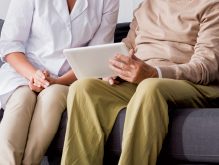By William H. Stager, DO, MS, MPH, FAAFP, FAAMA, FAAO, FACOFP dist.
 We all deal with stress every day and we hear about it everywhere. Friends and family, at work or play, on TV or movies, books or news: everybody’s talking about stress. So what are we doing about it?
We all deal with stress every day and we hear about it everywhere. Friends and family, at work or play, on TV or movies, books or news: everybody’s talking about stress. So what are we doing about it?
First, let’s define stress. Many years ago, Dr. Hans Selye, perhaps the most famous physician to research stress and its affects on us, had a fairly simple definition for stress. He defined stress as simply our response to change. Think about it: how do we respond to change? Implicit in this statement is the neutrality of the words “response” and “change”. The change can be big or little, labeled good or bad or otherwise, but it’s we who provide the labels and we who choose the response. And we usually respond in response to our labels! So who’s responsible for how we view the change and how we respond to it? We are!
I’m sure we are all familiar with examples of the ability of our minds to convince us that something is either good or bad and therefore doable or not. Our parents got us to do things or eat food, for instance, that we didn’t like, but managed to, after various forms of creative convincing. And we still do this, more or less, every day of our lives.
We all are living examples of how the body affects the mind and the mind affects the body. It’s often a basic truth that when we feel good we act good and when we feel bad we act bad. For example, you know that when you are nervous or worried about something, symptoms appear in your body, such as upset stomach, restlessness, headache, and so on. And the opposite is true: physical symptoms such as pain or illness can affect us emotionally and get us down, even depressed. So how we label changes and how we respond to them is our choice, and we can choose health and happiness.
Some incredible evidence has resulted from the large number of research projects over the years directed at the body-mind connections. A partial list of conditions that have been scientifically
proven to be affected by positive attitude techniques includes: • allergies and allergic skin reactions • asthma • anxiety • depression • digestive symptoms such as nausea, vomiting, constipation and stomach ulcers • heart pain and arrhythmias • high blood pressure • infertility • insomnia • pain of all types • pms.
I took a course with Dr. David Cheek years ago, who was then one of the best known physicians and researchers in the field of clinical hypnosis. He told us and demonstrated to us how he and other physicians had discovered and documented that people remembered everything while under anesthesia for surgery, and that with the proper suggestions, bleeding, side effects and healing times and responses were all significantly and positively shortened. The power of the mind is such that I have witnessed films of women having c-sections with no anesthesia, only hypnosis!
Many years ago, I had the good fortune to meet
Dr. Herbert Benson, the founder of the Mind/Body Institute in Boston, Mass. He is an associate professor at Harvard Medical School, and has done much of the ground-breaking research on bridging the affects of mind and body in science and medicine. He has written several books, hundreds of research papers, lectured internationally, and many of you may have heard of him or seen him on TV. His book: “The Relaxation Response”, addresses exactly what we have been discussing here.
He condenses the whole relaxation response to stress or change to two simple steps: 1) a sound or word or phrase or prayer, repeated silently or aloud, and 2) a passive attitude, i.e., not worrying or thinking about any other thoughts or distractions, but
always returning to one’s relaxed center of focus.
That’s it! Whatever your beliefs, culture, language or religion, you choose the word or phrase, and
repeat it gently and relaxedly for about twenty minutes at a time. You can sit or stand or walk, you can be in any environment. Just repeat your positive word or phrase in a relaxed and focused manner, without following any other thoughts that may come in. The results are tangible and reproducible and have been the subject of hundreds of research projects. Historically, this remarkable subject has been expressed for thousands of years in every culture and religion.
My practice of Osteopathic Manipulative Treatment (OMT) focuses on relieving pain and dysfunction of many kinds. All our patients report a relaxation
response as well, as the pain lessens, the body and mind relax, as the body and mind relax, the pain lessens, and so on!
I urge you all to do this, to learn to be focused and relaxed, and share it with everyone you know.
Imagine the results!
William H. Stager, DO, MS, MPH, FAAFP, FAAMA, FAAO, FACOPF dist.
AOBNMM Board Certified: Neuromusculoskeletal Medicine and Osteopathic Manipulative Medicine
AOBFP Board Certified: Family Medicine
Medical Acupuncture
Clinical Professor, Dept. of Family Medicine,
NSUCOM Clinical Associate Professor, Dept.
of Family Medicine, LECOM Medical Director, Flagler Institute for Rehabilitation, Inc.
311 Golf Road, Suite 1100
West Palm Beach, FL 3307
Tel: 561-832-1894
Physician is a Medicare provider
Check Also
Trusted Homecare Agency: Serving Veterans with Free Supplemental Home Healthcare
When it comes to healthcare, veterans deserve the best care possible. For veterans seeking in-home …
 South Florida Health and Wellness Magazine Health and Wellness Articles
South Florida Health and Wellness Magazine Health and Wellness Articles




